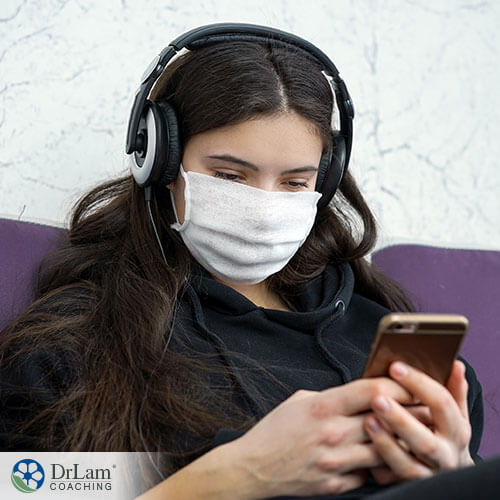 We currently live in a situation none of us were prepared for and the long-term effects of which remain unknown. Especially for young people. Because of the pandemic, parents now serve as the primary social contacts for their children. In the discussion of social distancing effects on teens, one result remains uncertain: How will an extended period of social isolation affect young people's social development?
We currently live in a situation none of us were prepared for and the long-term effects of which remain unknown. Especially for young people. Because of the pandemic, parents now serve as the primary social contacts for their children. In the discussion of social distancing effects on teens, one result remains uncertain: How will an extended period of social isolation affect young people's social development?
While the earliest social development occurs in the family, as children age the importance of contact with peers gains in importance. This becomes very obvious as children grow into their teenage years. The peer group takes the place of the family in socialization.
In the peer group, adolescents learn how to move appropriately through a complex social network. The foundation for growing into adulthood takes shape in these years.
Feeling deprived of this interaction with peers may emerge as a major source of stress for teens. And, as with any source of stress, it will set in motion a series of biochemical events in their bodies that stimulate the natural response to stress that everyone possesses. Will this set them up for later difficulties dealing with stress? Will it stimulate a situation of chronic stress as social isolation continues for long periods of time? The potential for the development of Adrenal Fatigue Syndrome (AFS) may grow as social isolation drags on.
Social distancing is recommended to slow the spread of COVID-19, but is the virus a danger to teens at all? Overall, the effects of this virus on children appear to be much less severe than on adults. The vast majority of those under 19 seem to experience fewer and milder symptoms with the exception of infants. The rates of hospitalization and developing critical or severe illness has been much lower in the pediatric population than in adults. However, increased rates of a condition known as Multisystem Inflammatory Syndrome in Children may be connected to COVID-19 and represent a more stealthy way young people are affected by the virus.
But what about those children who already suffer from an underlying condition? At the current time, it appears their risk of developing more serious complications from COVID-19 may be higher.
Some adults get the virus and show no symptoms, but they can still spread the virus. Whether this may be true with children and teens remains unknown at this time. It does appear likely, however. This is why social distancing is recommended for children, teens, and adults. Anyone could be a carrier and spread the virus to those who are more vulnerable.
With mandated social isolation also comes the need for children and parents to shift to homeschooling. While research clearly indicates many positives for homeschooling, there also come some negatives. Especially for those parents who are unable to devote extra time and energy to their children for various reasons, including work, financial difficulties, and adrenal fatigue.
 To begin with, homeschooling adds one more layer of stress on already-stressed parents. Most parents do not hold a teaching certificate and likely never thought they would teach their kids at home. This situation brings with it the need to develop new routines, schedules, and lesson plans, figure out school technology, and enforce the completion of new school tasks, all while balancing usual responsibilities, work, and trying to find some way of adding socialization for their kids.
To begin with, homeschooling adds one more layer of stress on already-stressed parents. Most parents do not hold a teaching certificate and likely never thought they would teach their kids at home. This situation brings with it the need to develop new routines, schedules, and lesson plans, figure out school technology, and enforce the completion of new school tasks, all while balancing usual responsibilities, work, and trying to find some way of adding socialization for their kids.
This adds stress to already stressed parents. For those with AFS, more stress leads to more burden on their already-fatigued adrenals.
This stepped-up stress level leads to the sympathetic nervous system releasing higher levels of norepinephrine and epinephrine in an effort to combat the stress. The ramping-up of these hormones leads to increased sleeplessness, increased risk of developing anxiety and depression, and increased risk of dysbiosis developing in the microbiome.
The increased norepinephrine and epinephrine flooding the system increases the likelihood of anxiety developing. With this kind of anxiety, it can worsen what is called health anxiety, common in a pandemic. This makes you more vulnerable to the misinterpretation and exaggeration of symptoms that can lead to a person feeling more sick than their symptoms warrant.
Increased demand on the adrenals for cortisol to fight the effects of stress can lead to depression developing. Often, this comes from an imbalance of serotonin and dopamine, two neurotransmitters that affect depression. The greatest amount of these neurotransmitters comes from the gut and microbiome. Dysbiosis there greatly affects the levels of these neurotransmitters.
In addition to the sudden shift in school responsibilities bringing a higher level of stress to parents, teens may also be feeling the effects. While one of the social distancing effects on teens involves fear of contracting a potentially deadly virus, homeschooling brings yet another source of stress for them.
Younger children may bounce back from these twin sources of stress. Children possess the ability to deal with many serious stresses and recover from them with few, if any, residual symptoms.
However, for older children on the verge of adolescence and in their teen years, the stresses of suddenly losing contact with peers and the outside world may be harder to tolerate. Losing the ability to mix socially with peers may bring serious consequences. For adolescents, prolonged social isolation may bring with it literal changes in their brains. The two periods of life in which the most changes in the brain take place include infancy and adolescence.
A longer period of social isolation devoid of personal contact and the associated opportunities to grow, develop, and learn will impact adolescents tremendously. In this, one of the most formative stages of life, the skills developed, the perceptions of self, the way one interacts with his or her world, and the beliefs formed all significantly affect the definition of oneself as one becomes an adult.
In addition, the added stresses of long-term isolation during this stage may well bring with them even more physical changes.
Thus, if prolonged social isolation leads to chronic stress, it could lead to significant issues as a result of these changes and other limitations that come with the current situation.
 While social distancing effects on teens in the physical sense do not approach the seriousness of the health effects of COVID-19, the collateral effects may prove significant. Homeschooling now becomes the norm in our country with its benefits and drawbacks.
While social distancing effects on teens in the physical sense do not approach the seriousness of the health effects of COVID-19, the collateral effects may prove significant. Homeschooling now becomes the norm in our country with its benefits and drawbacks.
Both for parents and teens with AFS, this responsibility brings with it added stress. This additional stress creates more demand on the adrenals for cortisol. Increased cortisol brings with it the risk of other untoward effects.
If cortisol levels fall too low, the SNS increases the output of norepinephrine and epinephrine. Increased levels of these neurotransmitters increase the risk of anxiety, panic attacks, and sleeplessness. Consequently, all of these result in additional stress.
Teens will experience stress from social isolation, particularly if it continues for a long period of time. This stress will bring about the same natural response as it does in adults. Possibly it will set the stage for long-term serious consequences of the same type as adults with AFS experience now.
If you worry about social distancing effects on teens, here are a few things you can do to alleviate the situation:
If you would like to know more about or need further assistance understanding social distancing effects on teens, the team at Dr. Lam Coaching can help. We offer a free** no-obligation phone consultation at +1-626-571-1234 where we will privately discuss your situation and various options. You can also send us a question through our Ask The Doctor system by clicking here.
© Copyright 2020 Michael Lam, M.D. All Rights Reserved.
The social distancing effects on teens have to do with the potential of long-term issues developing due to prolonged social isolation. Adolescents, in particular, appear to be most at-risk for these issues. In addition, the stress of homeschooling may add to the stress levels of parents with AFS.
